- Home
- Edward Lee
The Doll House
The Doll House Read online
THE DOLL HOUSE
Edward Lee
Necro Publications
— 2017 —
| — | — |
THE DOLL HOUSE © 2016 by Edward Lee
Cover art © 2017 by Amethyst Raven-Art
This edition © 2017 Necro Publications
ISBN: 978-1-944703-38-7
LOC: 2017905993
Book design & typesetting:
David G. Barnett
Fat Cat Graphic Design
fatcatgraphicdesign.com
Necro Publications
5139 Maxon Terrace
Sanford, FL 32771
necropublications.com
This ebook is licensed for your personal enjoyment only. This ebook may not be re-sold or given away to other people. If you would like to share this book with another person, please purchase an additional copy for each person you share it with. If you’re reading this book and did not purchase it, or it was not purchased for your use only, then please return to Smashwords.com and purchase your own copy. Thank you for respecting the hard work of this author.
— | — | —
For Tom Piccirilli, Rest in Peace.
— | — | —
Preface
Among my favorite horror writers of all time is M.R. James. Save, perhaps, for Lovecraft or Ramsey Campbell or Edward Lucas White, I’m aware of no scribe of the supernatural whose sheer prose-craft exercises the farthest limits of the utility of the English language. For this and many other reasons, I’ve read James more than any other writer. I’ve read everything he’s written dozens and dozens of times. In the last ten or so years, scarcely a night had confronted me where I haven’t presumed to sleep without reading a page or two of James. I’m a James Junkie! One time I read The Ash Tree twelve nights in a row, took one night off to re-read HPL’s Rats in the Walls, then read The Ash Tree again the next night. That’s pretty peculiar, isn’t it?
Naming my favorite James story is an utter impossibility. They’re all my favorite, even his very few duds. However, high in the list would have to be The Haunted Dolls’ House. Doesn’t sound very interesting, does it? A doll house? Big deal! Well, I guarantee you, it IS a big deal, and when you wake in the wee hours, it will have you seeing things of a nature altogether unpleasant.
My impression is that James’ style is one of the hardest to imitate, yet after a number of Lovecraft pastiches, I now feel it necessary to attempt James. I’ve tried to simulate his technique, and to “caricaturize” his voice and characters, making heavy use of reconstitutions of his ingenious turns of phrase. Of course, there are elements of my story that won’t be found in James’ work, namely explicit sex and violence. For this, I can only hope the great spirit of the man will forgive me.
Welcome to my doll house, and long live M.R. James!
Edward Lee
14 July 2015
Largo, Florida
A Dollhouse
Some time ago, if you bring your mind back, you’ll recall my retailing of a curious turn of circumstances referred to me by an acquaintance, a man I chose to call Mr. D—, and his purchase, from a dealer of some repute, of a rather outstanding… Well, I shall say only that it was an outstanding “acquisition.” This I mention only as a relative intimation (in the hope of whetting this reader’s appetite for a tale?) but will now suspend anything directly anent to that acquisition. What I mean, then, is that an occurrence fairly similar was related to me by the friend of a friend, in what is obnoxiously called the “smoking parlor” of the lounge at the Globe Inn near Burnstow. This adventure—if you could call it that—involved a man of ancestral wealth by the name of Reginald Lympton (the name is not a fabrication). As to the character of Mr. Lympton, I suspect the reader will be astute enough to form a very expeditious judgment, and it may be justifiable to add a wee observation, however, and (not to appear deliberately abstruse, which authors are readily accused of being), make metaphor by saying that all manner of commonplace human experience may on the rarest of occasions become host to some dark and very uncommon crannies, and it was into one such cranny that Mr. Lympton accidentally stumbled…
««—»»
As far as I can ascertain, the provenance of the matter came in the summer of 19—, truly, a jewel of a summer, distinguished by over-bright flowers, azure skies, and wind-swept fields whose grass could only be described as deliriously green. It was the kind of day about which Lympton’s wife, Mary, would often remark at breakfast, “A good to be alive day, wouldn’t you say, dear? Who can doubt the existence of God on a day such as this?” Well, Reginald Lympton had little use for such observations, for he very much did doubt the existence of a supreme deity, of God in particular, and in spirituality over all. And he was clearly not the sort of man who might appreciate natural beauty of any manner. It was to material wealth that he paid his appreciations to, the pleasures of the world, and the Almighty Quid. These and only these compounds of life made sense to Lympton; and just as he had little use for non-material veneration, he had little use for a wife, namely Mary. Now, for a woman over whose head fifty years had passed, Mary had retained a good deal of the physical charms that had blessed her in youth (in fact, Lympton’s very few friends at the club always intimated what a lucky man Lympton was to have “a bird like that in your roost,” or to “wake up to a pair of milk-cans what like’s what she got hangin’ on her chest,” etc. Mary was Warwickshire stock: robust of bosom and curvature yet unprone to the excess poundage that came to most in middle age. (Lympton, however, next door to twenty stone and a confessed gastronomer, could not boast the same.) She was quiet, to herself with her meditations and religion, and nearly invisible to Lympton, which was just the way he liked it. And, to give her credit, she kept the servants in order, oversaw a spotless abode, maintained a steady-going household, and prepared the most brilliant renditions of Toad-in-the-Hole and Steak and Kidney Pie his palate had ever encountered.
Lympton, by the way, in an unlikely coincidence regarding his ancestral surname (actually, once a titled name hailing from Old Surrey), walked with a limp. To others, Mary included, he attributed this to “shell fragments at Verdun, those bloody Huns, but I assure you, I gave it back to the devils tenfold”; yet in truth, Lympton had not served in the Great War, nor had he ever been deputed in any way as a militaire. His limp was the result of falling from a tree-house as a child when the upper most rung on the ladder gave way under his overweight. Hence, Lympton limped into the dining nook, where he and his wife shared inconsequential company at breakfast-time.
“And what have you been doing this fine summer day, sweetheart?” Mary asked from her standard place behind the tea urn.
Lympton picked up that day’s post delivery from the table. “Oh, the usual thing, my dear, the usual thing,” came his indirect reply.
He flipped through the mail, and singled out one stout envelope that promised to be of interest. “I inspected the grounds, and found them in some reasonable semblance of order, had a chat with Leventhorp next door, then took in a bit of a walk, remembering what the doctor had advised about exercise.”
Yet this answer to Mary’s question, like so very many, were outright lies. He had not exercised, had not inspected the grounds, and had not exchanged discourse with their surly neighbor; instead, Lympton had masturbated in his study whilst thinking about Leventhorp’s young and comely daughter. Then he’d taken some Medoc and had a satisfying nap.
“And now,” he added, “I mean to give my collection a dusting.” This suffix, however, was not a lie, for he intended to do just that after his tea.
The reader will logically wonder next just what sort of things comprised Lympton’s “collection”— or, no, I do you disservice. This story’s title will have already told you.
> Mary poured the tea, hiding the smirk generated by the fact that her husband had made absolutely no notice of her brassiereless state; and this state, along with her smart lavender summer dress with the plunging neckline, divulged an image of a bosom that any man would carry in his memory for some lengthy time. It was a large mammarian carriage, indeed, yet each fleshy orb, easily the size of an infant’s head, remained high, pert, and firm even after the accrual of half a century.
Lympton, as was his wont, seemed oblivious; Mary suspected that she could well have been stark naked and her husband would not have batted a proverbial eye.
He fastidiously opened the envelope.
“It’s from that man Britnell, isn’t it?” Mary remarked. For the sake of pleasantry, she added, “I hope he found an exciting new addition for you, dear.”
Lympton had not heard her, or if he had, he disregarded her. From the envelope, he withdrew the rather lengthy quarterly itemization that he much looked forward to: the current catalogue of Britnell & Sons, Ltd., perhaps the premier reseller in all the country of objets d’art of every kind. Lympton had made some of the finest purchases of his celebrated collection from this J.W. Britnell, including, most recently—and for considerable sums—the famed Merriwether Doll-House (circa 1784); and the Epping House (circa 1850); and Suit Manor (unknown). Affixed to the top of the emporium catalogue was nothing less than a personal communiqué typed by the dealer himself.
My Esteemed Friend,
It is my pleasure to make you apprized of the fourth entry of the classified advertisements located at the back of the attending catalogue. I have circled it in red, for your convenience, and shall be delighted to supply any further information you may need, i.e., directions, seller’s history, delivery arrangements, etc.
I am,
Yours most cordially,
J.W. Britnell
This might be the added treat the day needed. As Lympton was a special rather than a regular customer, he received these alerts on occasion, having paid a yearly retainer to the dealer for the like, so that he, Lympton, might have opportunity to investigate appropriate classifieds before the rank and file buyers. Britnell did not make such recommendations frivolously; hence, his credibility in such matters was unimpeachable. With the work of several seconds, Lympton had eagerly discovered the indicated advertisement, outlined in red.
—MUST SELL FOR MEDICAL EXPENSES!
Exemplary Doll-House, VG Condition, c. 1690,
with Figures & Accessories. ₤500 firm.
Built and Inscribed by Lancaster Patten…
This last clause of information very nearly shocked Lympton’s already overtaxed heart to a halt. It can’t be, he thought. He actually found it necessary drop a hand to the tea-table in order that he might steady himself.
“It’s documented that Patten built four doll-houses…”
“I’m sorry, dear?” Mary said of his utterance. She hunched her shoulders either as if at a chill or in the vain hope that her husband might finally take note of her arresting cleavage.
“Lancaster Patten. He’s arguably the Julius Caesar of miniaturists and doll-house builders. Only three of his works are materially known: Legerski in Krakov, Tidwell in Stockholm, and Peirce in America.” Lympton recited the obscure history in a daze of disbelief. “But when he sold his first three works, the original buyers all made a universal observation: that he was building a fourth, his Magnum Opus, you might say. A lifelong endeavor. And they have his only surviving diary at the Shepley Museum. I’ve been there and read it. In the last entry, dated 30 April, 1690, Patten wrote this line. ‘At long and at last, I am finished! The house is done!’”
During the recital, Mary had moved from her usual seat to the seat closest her husband, and she affectionately ran her hand up the back of his thigh where it stopped on a massive buttock. She feigned enthusiasm, “How wonderful! And your man in London, Britnell, has the fourth house for sale?”
Lympton stared outward. “Regrettably, no, but one of his classifieds claims to—” His eyes returned to the page:
MUST SEE TO BELIEVE!
All Inquiries Welcome,
No Appointment Necessary.
See Mr. Brown, 6 Old Post Road, W.S.
A fraction of a moment before Mary’s hand would’ve slipped around to Lympton’s crotch, he quickly deported himself to the bookshelf, surveyed the spines, and withdrew, with some anxiousness, his copy of Murray’s Guide to Sussex. And after a few turns of some pages: “What luck! It’s just over the line in West Sussex! Nine miles, or less. I must go there posthaste!”
Mary’s creamy shoulders slumped. “Must you? Now? Right this minute?”
“I’m afraid so,” Lympton assured, checking his fold and looking for his stick. “Every second that ticks by is a second in which I could be deprived of something quite close to the find of the century in the world of doll-house collections.”
Mary felt certain that this was too astringent an estimation, though she did not give voice to it. Instead, she said with a twinge of hope, “Oh, but, dear, it’s the driver’s day off.”
“Bugger the driver,” Lympton replied without so much as a glance in her direction. “I’ll pilot myself—I’m quite good with the motor, you know.”
Mary’s eyes assayed her husband with an all-too-familiar dullness of disappointment; the words in her head need not be discussed. Was it with a minimum of loath that she next lowered the straps of her dress and lifted out her plenteous, large-nippled breasts? “For goodness sake, Reginald! We’re properly wed in the eyes of God for heaven knows how long! Have you no desire whatever for your dutiful wife?”
These new motor-cars no longer possessed handcranks, but instead a battery or some such and key with which to deliver a sufficient electric charge and cause the motor to commence. Lympton hastily located said key, then looked at his wife. “Desire? Oh—ah! Worry not, love, there’s more desire than you can know surging in these southerly regions,” came his preposterous reply. “But no time just yet. I must be off!”
Mary had assumed a rather lewd posture: her thighs parted, the hem of her dress hiked up, and the aforementioned bare breasts cradled seductively in her hands. Betwixt her legs, the evidence of her “secret garden” could not have been more apparent. Lympton, now ready for his journey, donned his cap. He leaned over and kissed his wife on the cheek. “Keep the fire of your loins hot, my dear, for soon I shall return, and my friend John Thomas and I will furnish more passion that you can stand,” and with this, he limped away.
Mary continued to stare through her embarrassed frustration. She took her hands from her breasts and muttered, “John Thomas, my ass. That fat sod I have for a husband would rather fuck a doll-house than his own wife…”
««—»»
The auto was a 1927 Lagonda, obsidian-black, with chrome wire-wheels and a webbed canvas top that elevated in the event of inclement weather. Being a man not only of leisure but a man of private means, Lympton never liked to keep a motor-car for more than three years, for fear of what the neighbors might set to chattering about. He felt it quite necessary to keep them aware of their financial status when juxtaposed to his own, theirs being an inferior status. Cap and driver’s gloves donned, and 2.5 litre engine turned over, he motored with authority out of his manor’s cul-de-sac, and glimpsed said manor shrinking in the windscreen mirror. His wife’s concupiscent “offer”—in spite of physical attributes which would rightly be called provocative—left Lympton more annoyed than aroused. Couldn’t the silly woman reckon that though monotony may well have been the sauce of life, variety was the spice, as the adage went, and after two decades of marriage, Mary had become a veritable font of sauce. Now there, he appraised, passing Leventhorp’s front gate, there by George, stands all the exotic spices of the Indies. This rather flaccid metaphor he directed at Leventhorp’s young daughter, who paused amid her bird-feeding to—it is nothing more than the truth—raise the hem of her Easter-white shift and purvey to Lympton’s eyes…
/>
Well, never mind precisely what she purveyed. Lympton drove on with a content smile and a pleasing buzz about his loins. One day, dear thing, my “sword” will be hilt-deep in your womanly scabbard, and I shall pay for that privilege whatever you might be inclined to ask.
But such musings aside, he motored past and instead was embraced by the equally pleasing thought of just what he might be venturing to now: The fourth and final pièce de résistance of Lancaster Patten. Could it be true? Might he instead be subjecting himself to a clever ruse of imposture in others? A counterfeit seemed hardly likely: Britnell was the preeminent dealer, and he knew his customer and would never jeopardize his repute (which he set store by) by sending a notice of such import without worthy scrutiny. But even if such a ruse were in place, and a fake Patten doll-house stood waiting at the end of this journey, Lympton’s meticulous eye would discern this at a glance, after which he would return a note to Mr. Britnell not quite as pleasant as the note he received.
His trek took him down winding county lanes which bisected dense woodlands of pine and oak; it was the acme of the season. This moving panorama presented a natural spectacle that many writers would revel in to describe…but I’m sorry to relate that I am not one of these writers; hence, all that lovely scenery must be surrendered to the imaginations of the readers. And, due to considerations of space, we will not follow our Mr. Lympton through every meter of his journey. Instead it must suffice to say that in the better part of three quarters of an hour, the purring automobile pulled round the unpaved court of a large old garreted house—an architectural eyesore, in Lympton’s view—which seemed infected by extravagances of the Gothic Style so redolent of the end of the seventeen century but also with later nuances of the Victorian and Edwardian. It was queerly devised from the standpoint of construction, reflecting many additions over time; its lower storey was of wrought fieldstones, while timber formed the upper storeys. Old, yes, as I’ve said, and dilapidated: shingles missing, or in an apoplectic condition; some sort of ghastly brown stuffing replacing numerous broken window panes; corroded embrasures; a worm-eaten pediment over the front door; and a preposterous turret atop a just-as-preposterous octagonal tower. It may have been a grand manor in bygone days.

 In the Year of Our Lord 2202
In the Year of Our Lord 2202 The Minotauress
The Minotauress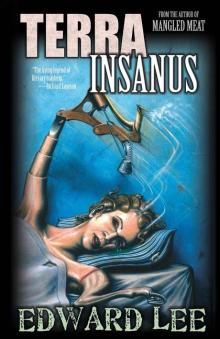 Terra Insanus
Terra Insanus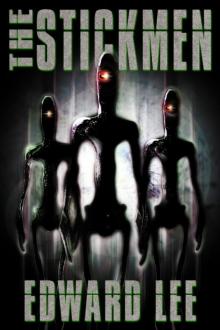 The Stickmen
The Stickmen Flesh Gothic by Edward Lee
Flesh Gothic by Edward Lee Family Tradition
Family Tradition You Are My Everything
You Are My Everything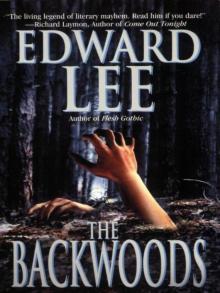 The Backwoods
The Backwoods The Teratologist
The Teratologist Smoke and Pickles
Smoke and Pickles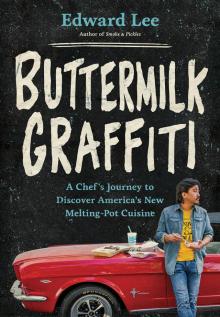 Buttermilk Graffiti
Buttermilk Graffiti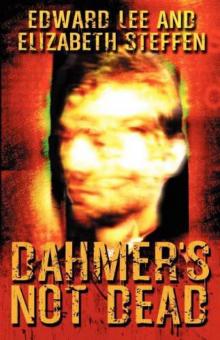 Dahmer's Not Dead
Dahmer's Not Dead Quest for Sex, Truth & Reality
Quest for Sex, Truth & Reality The Innswich Horror
The Innswich Horror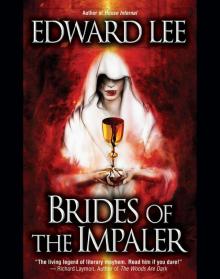 Brides Of The Impaler
Brides Of The Impaler Goon
Goon Trolley No. 1852
Trolley No. 1852 Sacrifice
Sacrifice Monster Lake
Monster Lake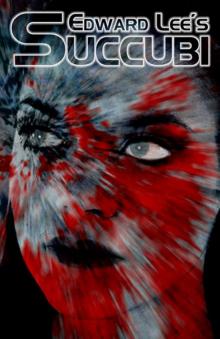 Succubi
Succubi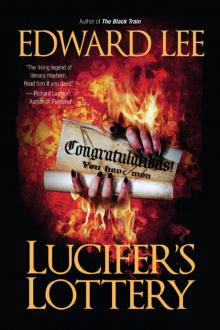 Lucifer's Lottery
Lucifer's Lottery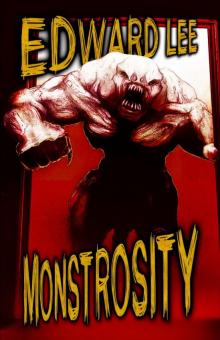 Monstrosity
Monstrosity The House
The House The Dunwich Romance
The Dunwich Romance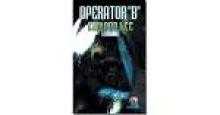 Operator B
Operator B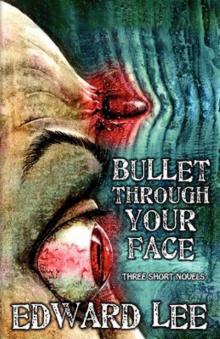 Bullet Through Your Face (improved format)
Bullet Through Your Face (improved format)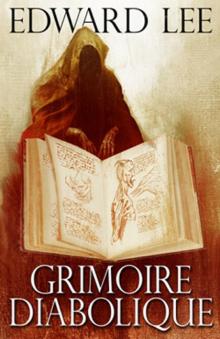 Grimoire Diabolique
Grimoire Diabolique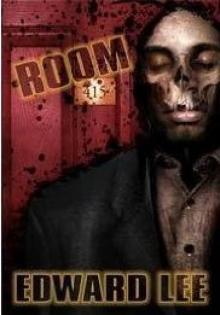 Room 415
Room 415 The Messenger (2011 reformat)
The Messenger (2011 reformat) Incubi
Incubi The Black Train
The Black Train House Infernal by Edward Lee
House Infernal by Edward Lee City Infernal
City Infernal Creekers
Creekers The Haunter Of The Threshold
The Haunter Of The Threshold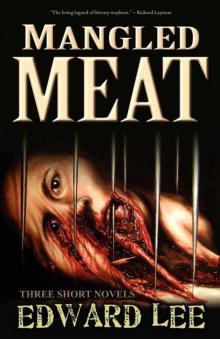 Mangled Meat
Mangled Meat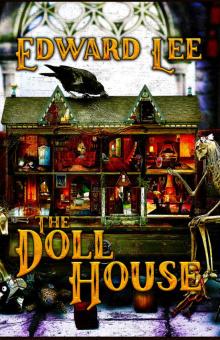 The Doll House
The Doll House Header 2
Header 2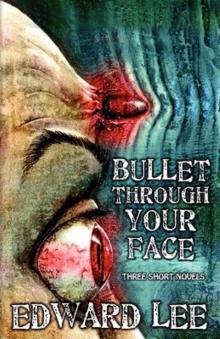 Bullet Through Your Face (reformatted)
Bullet Through Your Face (reformatted)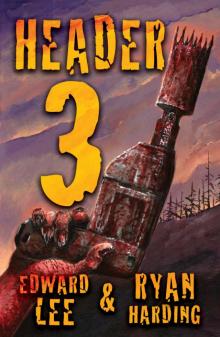 Header 3
Header 3 Infernal Angel
Infernal Angel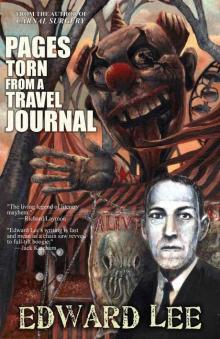 Pages Torn From a Travel Journal
Pages Torn From a Travel Journal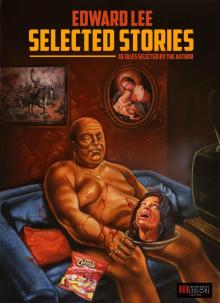 Edward Lee: Selected Stories
Edward Lee: Selected Stories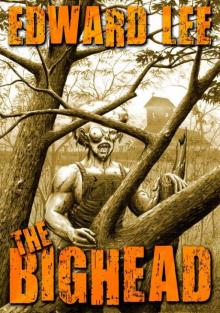 The Bighead
The Bighead The Chosen
The Chosen